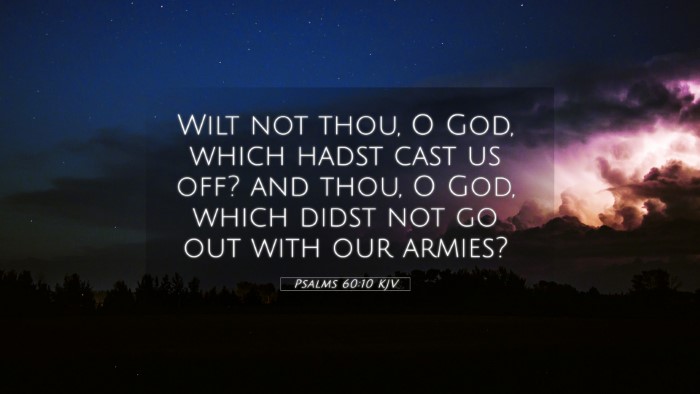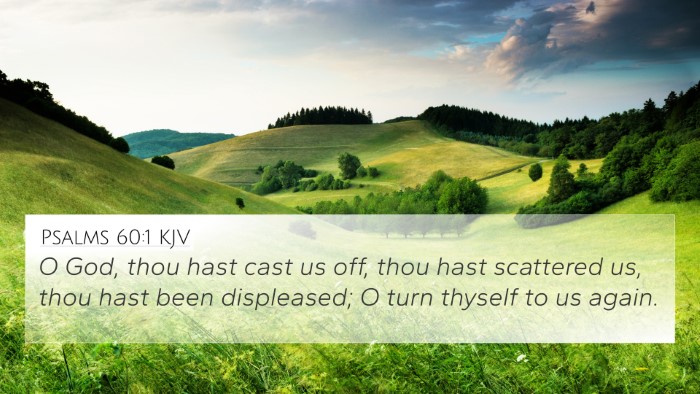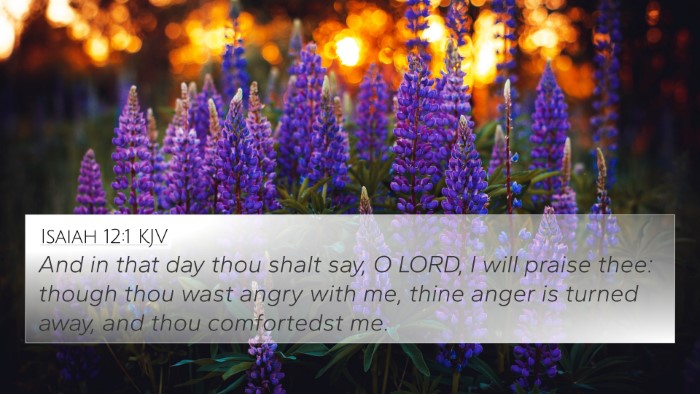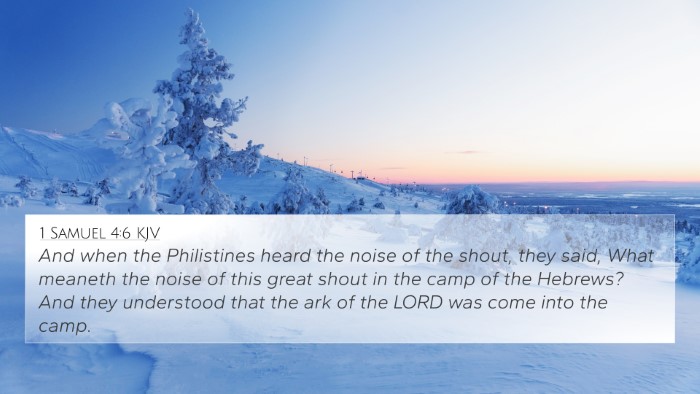Understanding Psalms 60:10
Psalms 60:10 reads: "Is it not you, O God, who has rejected us and no longer goes out with our armies?" This verse expresses a deep sense of abandonment and questioning from the psalmist towards God, reflecting on a time of despair in the face of overwhelming odds.
Summary of the Verse
This lament acknowledges a perceived withdrawal of God's presence in the midst of conflict or struggle. The psalmist grapples with the implications of feeling alone against their enemies, and this reflects a broader theme found throughout the Bible regarding the need for divine support in times of trouble.
Commentary Insights
-
Matthew Henry's Commentary:
Henry emphasizes the emotional weight of this verse, noting that it is a cry for recognition of God's absence. He interprets this as a moment where the psalmist feels the burden of spiritual desolation, akin to the experiences of the Israelites during times of war and strife. Henry suggests that this verse serves both as a confession of divine absence and an appeal for divine intervention.
-
Albert Barnes' Notes:
Barnes expounds on the notion that Israel's victories were contingent on God's presence. The absence mentioned in this verse denotes a cause for concern among the people, suggesting that their military struggles are not solely physical but also spiritual. He posits that military success without divine favor offers a hollow victory.
-
Adam Clarke's Commentary:
Clarke discusses the implications of feeling forsaken and highlights how this feeling can resonate deeply with believers today. He offers a connection between the events recounted in this psalm and other scriptures, demonstrating that the feeling of abandonment is a part of the human experience and encourages believers to seek God's presence amidst their challenges.
Cross References to Other Bible Verses
This verse can be likened to several others throughout the scripture that mirror the sentiment of abandonment and the need for divine assistance:
- Psalms 44:9 - "But now you have rejected and humbled us; you no longer go out with our armies." This reflects similar themes of realized divine absence in battle.
- Psalms 10:1 - "Why, O Lord, do you stand far off? Why do you hide yourself in times of trouble?" Here, the cry for God’s proximity amidst suffering resonates with the sentiment in Psalms 60:10.
- Isaiah 59:2 - "But your iniquities have separated you from your God; your sins have hidden his face from you, so that he will not hear." This highlights consequences for feeling disconnected from God.
- Hebrews 13:5 - "Never will I leave you; never will I forsake you." This New Testament reassurance contrasts the feeling of abandonment in Psalms 60.
- 2 Chronicles 15:2 - "The Lord is with you when you are with him. If you seek him, he will be found by you; but if you forsake him, he will forsake you." This emphasizes the relational aspect of God's presence.
- Lamentations 3:22-23 - "Because of the Lord’s great love we are not consumed, for his compassions never fail. They are new every morning; great is your faithfulness." This passage brings hope after the despair expressed in Psalms 60:10.
- Matthew 28:20 - "And surely I am with you always, to the very end of the age." A powerful teaching on the continual presence of God, countering the feelings of abandonment.
Relationships with Other Scriptures
The emotional response in Psalms 60:10 draws parallels to various narratives throughout the Bible. For instance:
- The Exodus narrative, where Israelites often encountered feelings of abandonment in the wilderness.
- The Book of Job, particularly in Job's lament about feeling forsaken while suffering unjustly.
- Jesus' cry on the cross, Matthew 27:46: "My God, my God, why have you forsaken me?" mirrors the plea found in Psalms and encapsulates the human experience of isolation.
Thematic Bible Verse Connections
The theme of divine presence in turmoil can be linked to several other themes across scripture:
- Faith in the face of adversity is seen in Romans 8:31, "If God is for us, who can be against us?"
- The promise of God’s help in Psalms 46:1: "God is our refuge and strength, an ever-present help in trouble."
- David's expression of distress and reliance on God in Psalms 34:17: "The righteous cry out, and the Lord hears them; he delivers them from all their troubles."
Conclusion
Psalms 60:10 serves as a poignant reminder of the struggles believers face when they feel distanced from God. By examining this verse through various commentaries, it becomes clear that it not only reflects an emotional cry but also encourages a deeper understanding of maintaining faith amid crises. Through cross-referencing with related verses and scriptures, one can appreciate the resiliency of faith and the promise of God’s eternal presence.

















